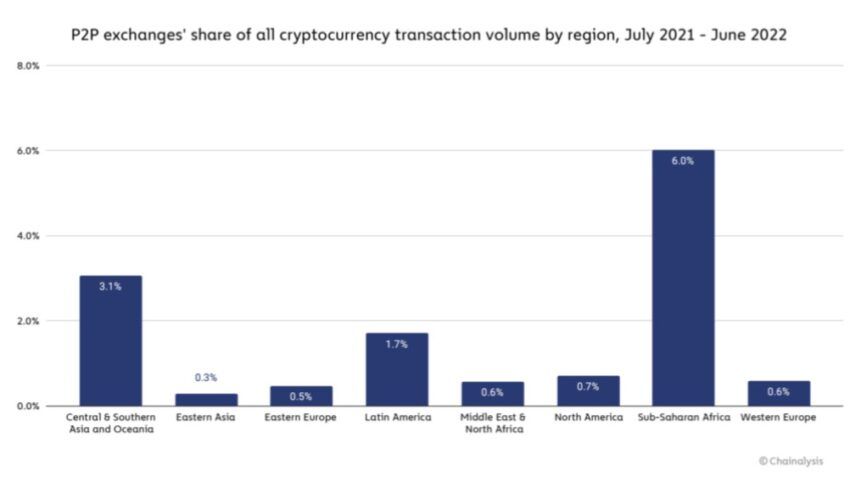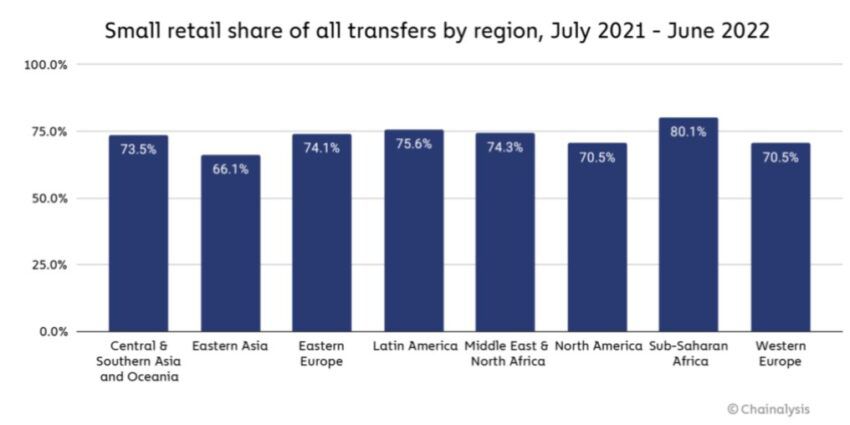Despite numbers revealing that Sub-Saharan Africa has the lowest cryptocurrency transactions compared to any other region, the continent is home to some of the most advanced cryptocurrency ecosystems, according to the most recent Chainalysis findings.
The report showed that the excessive use of P2P platforms set the African region apart, highlighting, “Retail-sized transfers below $10,000 make up 6.4% of its transaction volume, more than any other region. The role of retail becomes even more apparent when we look at the number of individual transfers.”
Increased P2P reliance in Africa due to regulations
Retail transfers account for 95% of all transactions in the region, as per the report. It added, “P2P exchanges account for 6% of all cryptocurrency transaction volume in Africa, more than double the share of the next-closest region, Central & Southern Asia and Oceania.”
Ray Youssef, CEO of Paxful, also suggested how regulations influence crypto activity while driving reliance on P2P usage.
The analyst noted in the report, “Nigeria restricted the usage of the naira for buying crypto in 2021 due to concerns around scams and tax evasion, and because of that, many people began trading peer-to-peer.”
India also reported increased use of P2P exchange after the Reserve Bank of India maintained a negative stance on crypto use, preventing institutional banks from extending services to the cryptocurrency market.
However, the country’s overall adoption also took a hit as India fell from the second-largest crypto-loving population to fourth spot year-on-year according to another report by the analytics firm.

The South African Reserve Bank recently released guidelines for local banks to do business with cryptocurrencies and cryptocurrency companies.
A decline in exchange rates could be driving crypto usage
Previously, the analytics firm noted that Nigeria and Kenya, with top 20 ranking in the Global Crypto Adoption Index, have a strong presence in the P2P market.
Adedeji Owonibi, the founder of Nigeria-based blockchain firm Convexity, told Chainalysis, “We see a lot of daily traders who are trading to make ends meet.”
The volatility of the Nigerian naira, he remarked, also contributes to the demand for cryptocurrencies in the nation. Lately, the naira’s value against the US dollar has been on a decline with forex reserves of the Nigerian financial system depleting.
Notably, the report finds that crypto usage this year is driven by daily necessity as opposed to speculation by the wealthy, adding, “The number of small retail transfers actually grew starting at the onset of the bear market in May, while the number of transfers of other sizes fell.”
That said, Sub-Saharan Africa’s reliance on outside remittances and increased commerce is powering commercial and other use cases of crypto.
Owonibi told the analytics firm, “Companies need to buy materials from the United States, but there’s no way to get the money there — they’re left with no option but to use USDT.”
Chainalysis anticipate that the use of cryptocurrencies in Sub-Saharan Africa is set to increase as long as regulations, economic volatility, and the need for cross-border transactions remain.
Disclaimer
All the information contained on our website is published in good faith and for general information purposes only. Any action the reader takes upon the information found on our website is strictly at their own risk.


